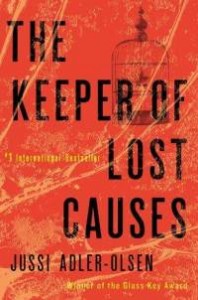 The prologue of Jussi Adler-Olsen’s The Keeper of Lost Causes (translated by Tiina Nunnally), the first in the Danish Department Q series, made me think of one of the few Latin phrases I retained from school: in medias res, or in the middle of things. The story starts with a woman trapped in a dark prison, scraping along the walls with bloody fingers, looking for a means of escape. She hurts herself but doesn’t scream or cry, refusing to allow her captors the satisfaction.
The prologue of Jussi Adler-Olsen’s The Keeper of Lost Causes (translated by Tiina Nunnally), the first in the Danish Department Q series, made me think of one of the few Latin phrases I retained from school: in medias res, or in the middle of things. The story starts with a woman trapped in a dark prison, scraping along the walls with bloody fingers, looking for a means of escape. She hurts herself but doesn’t scream or cry, refusing to allow her captors the satisfaction.
Cut to Carl Mørck, a homicide detective with the Copenhagen police, returning to work after a bad shootout that left one of his colleagues dead, another paralyzed, and Mørck with a scar from the bullet that grazed his head. He’s brilliant but difficult so his boss creates the new Department Q in the basement at headquarters, where Mørck can work on “cases deserving special scrutiny” (translation: high-profile cold cases) and stay away from colleagues who are weary of him. He gets a Syrian assistant named Hafez el-Assad, who seems more eager to go through the old files than Mørck is. Assad finally gets the detective to look into the disappearance of political darling Merete Lynggaard, who was last seen with her mentally handicapped brother, Uffe, on a ferry headed for Berlin five years earlier. Accidental drowning, suicide, and assault were all suspected but her body was never found. The story moves back and forth between 2002 and 2007, revealing Mørck and Assad’s progress on the case while showing what really happened to Merete.
Scandinavian thrillers are usually dark and moody, and Keeper is, but it also has wit, warmth, and a winning comic pair in Mørck and Assad. The veteran detective is committed to his grumpiness and inertia; he takes every opportunity to nap and daydream about the attractive police psychologist. Assad is indefatigably cheerful, and can set up a flat-screen TV in under five minutes but is stumped by the copy machine. He’s a surprising character, tantalizingly mysterious, and by the time he shows an unexpected dimension toward the end, I was convinced he’s one of the most fascinating sidekicks to come along in crime fiction in years.
Adler-Olsen’s supporting characters are no less memorable. Merete, whom we get to know in flashbacks, is a victim who refuses to be one. She retains her fighting spirit in the face of unrelenting bleakness, and her deep love for her brother Uffe is touching. On the other side of the table, the villains have believable motives for the horrific things they do. Their reasons don’t justify their actions—nothing does—but for a brief moment as they explain everything, I felt an unexpected flash of sympathy for them. When was the last time you felt that for the bad guys? The ending moved me in more ways than one, and made me look forward to spending more time in the basement with Deparment Q.
Nerd verdict: Lost Causes is a keeper






9 Comments
EIREGO
August 24, 2011 at 9:46 amFeeling bad for the bad guys? Okay, I’m intrigued. A lot of good and weird mysteries come out of Copenhagen. Will pick it up for end of Summer read stack.
Pop Culture Nerd
August 26, 2011 at 1:17 amI’m so hooked on all this ScandiCriFi right now. I think you’ll like it.
Lauren
August 24, 2011 at 2:22 pmWell you know from our ad nauseum discussions that I loved this one as well. Just heard somewhere that the next has been queued up and the others awaiting translation. Can’t wait!
Pop Culture Nerd
August 26, 2011 at 1:18 amYippee! I hope they fast-track them.
Poncho
August 24, 2011 at 10:02 pmYou got me hooked. Gotta get that book ASAP
Pop Culture Nerd
August 26, 2011 at 1:18 amYay! Let me know your thoughts after you read it, Poncho.
Natalie ~ the Coffee and a Book Chick
August 25, 2011 at 2:37 pmThis sounds perfect for the upcoming RIP Challenge in October. What is up with Scandinavian books being so creepy?! The opening alone makes me want to sleep with the lights on tonight. I’m ordering it stat.
Pop Culture Nerd
August 26, 2011 at 1:19 amWhat’s the RIP challenge? This book is disturbing but the humor makes it more tolerable.
Danmark
February 15, 2012 at 12:39 amThis story is character driven from the surly Mrs. Sorenson to the gruff, but empathetic Jacobsen to the mentally damaged Uffe. Adler-Olsen doesn’t throw away minor characters, but brings them into a new light and shows the effect they have on others. You really feel the anguish of Lynggaard in her prison, the frustration of Morck with his assistant’s tidbits of knowledge, his wife’s constant nagging, and his tenant’s quirks and sympathy for a confused Uffe. Despite the foreign locale, the unpronounceable Danish names, and the fact this reader deduced the bad guy early on, this award winning author’s story is delightful, suspenseful, and makes you root for the good guys.